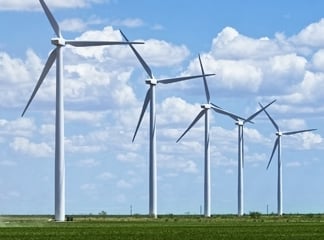The growth of the renewable energy sector has created opportunity for insurers – growth that is being fostered through partnerships between owners, brokers and insurers representing both industries.
RSA recently hosted a technical conference on energy insurance in renewable and thermal energy, in partnership with General Electric.
“The cross-section of stakeholders in attendance was fantastic,” says Louis Vatrt, AVP – director of construction & engineering, specialty property insurance at
RSA Canada. “Everyone was really pleased to see the involvement and support from RSA’s senior executive team, and we received excellent feedback from participants regarding the relevancy and depth of information provided by the presenters.”
The conference, which brought together brokers, risk managers and industry experts to discuss best practices and technical learnings, identified the concerns and solutions for insurers and clients regarding risk and exposures.
“We as a company address many of the concerns insurance companies have about the wind industry; primarily technology risk,” says Guy R. Crepeau, Sales Director, Onshore Wind for GE Renewable Energy. “We have a very structured and mature approach – one that is evolutionary versus revolutionary – so we are able to help insurance companies and ultimately our customers manage risk by ensuring we’re not doing anything radically different as we evolve our turbine platforms.”
The second important point for insurers is the experience that GE brings with it, Crepeau told
Insurance Business.
“Insurance companies and our customers want to do business with service providers who have domain experience and expertise,” he says. “Wind plants need to produce energy when the wind is blowing” and insurers need to feel confident about the life-cycle services required to maintain fleets, says Crepeau, and the ability to collect data and combine it with digital tools to better operate, maintain, predict and optimize how our wind turbines perform and is a GE differentiator for the industry.
“Our primary purpose for conferences such as this one is to make sure our customers, their stakeholders, and other industry participants are current with GE technology, its services and its differentiated capabilities,” says Crepeau. “The more the industry knows about what we're doing with technology, then the easier it is for them to understand what risks they can accept. It's what we call a state-of-the-art learning experience for wind industry stakeholders.”
According to Vatrt, one major brokerage reported losses over a given period of time since 2005 of (US) $1.8 billion – a strong indicator that the market is in need of coverage.
“These losses reflect a range of different causes, with some clear patterns emerging,” says Vatrt. “In total, losses attributed to weather events, fire, or machinery breakdown account for more than 95% of the 150 losses used in this analysis.”
Machinery breakdown losses dominate in terms of the number of instances at 76%, with the majority of those losses being turbines, generators and transformers.
“As we all know, all types of commercial and industrial locations have proven vulnerable to weather-related events — it’s not just a risk that predominantly affects the power industry,” says Vatrt. “While weather-related impacts are subject to only limited forms of control — for example, lightening protection on wind turbines — we at RSA believe that both technology and maintenance risks can be, and generally are, more thoroughly managed with written emergency contingency plans.”
Stressing the value of monitoring and controlling the technology employed, notably for reliability as well as efficiency, and ensuring a proper program of maintenance and spare components/parts are clearly critical components of loss prevention, Vatrt points out, and in turn, loss prevention is essential for ensuring reputation, operating efficiency, and reduced premium rates.

Brokers looking to explore selling coverage in the traditional and renewable energy sector can turn to RSA for help in understanding both the exposures and the products that best suit the different needs in the market.
At RSA, Vatrt leads the Dedicated Equipment Breakdown team and the Dedicated Renewable Energy team, each consisting of Underwriters, Risk Control engineers, Claim Handlers and a National Practice.
“Power generation and distribution is a target class of business for RSA,” says Vatrt. “We have a strong appetite for this complex business. In my career, for example, I have operated equipment, maintained it, installed it, inspected it as a risk control/account engineer and settled some very big losses. My team has an equally in-depth knowledge which translates into customized, holistic insurance solutions for complex risk within the energy industry.”



